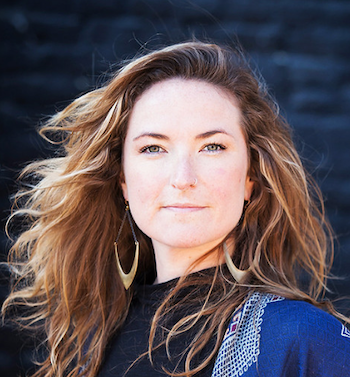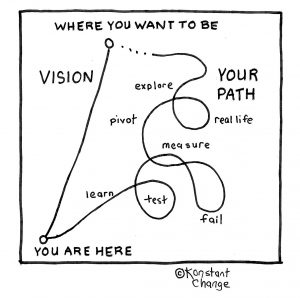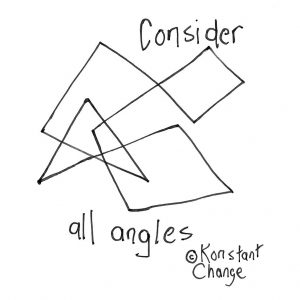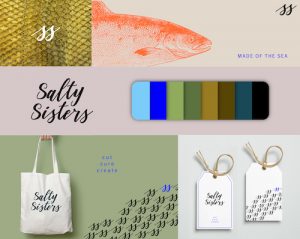
In my series of coaching interview articles, I share insights from a number of different types of coaches. My cornerstone article on this topic offers coaching definitions of the various coaching disciplines.

Recently, I met with Casey Carroll, a life coach who also delivers brand, marketing, and creative services for women entrepreneurs and women-led brands.
There are a couple definitions of personal and life coaches here. Like the classification implies life coaching focuses on how work and all your activities affect your personal life.
While meeting with Casey, it was clear, regardless of training or certification, each coach brings something entirely unique to the discussion and process.
Casey’s Creative Style
Because of my own design training, Casey’s creative background captured my interest. She is the owner of Bold Woman Brands, a holistic creative agency dedicated to empowering women in business through sound strategic counsel, whole person coaching and soulful creative.
Although she offers separate services, she believes coaching is an essential component of the creative and brand building process.
In addition to offering one-on-one coaching services and a variety of workshops, retreats and support circles, Bold Woman Brands integrates a coaching style relationship into all of its client services. so every woman and woman-led brand feels holistically supported as she puts her vision for her work out into the world.
Interview with Casey Carroll
Marti: It looks like your approach to professional branding is woven together with personal coaching. How did you come up with this unique style of coaching?
Casey: After years of working in the creative industry in a variety of marketing roles, I was disappointed by how cerebral, formulaic and disconnected much of the process of image making, marketing communications and visual and verbal identity building felt. There was little to no attention on the inner experience, conditioning, hopes or dreams of the client and a much heavier emphasis on identifying what could sell.
For example, if a client wanted to polish up their professional image, no one was really talking about why she wanted to look professional or what professional meant. And who’s definition of professional was being used? No one asked her if she actually agreed with the definition.
It felt concerning to me, like we kept repeating the same norm without care for the inherent brilliance and specialness of each company, person or project. I felt we needed to provide a more holistic service with more depth, meaning and compassion. We needed to accommodate the ways in which our lives and cultural conditioning are entwined with our business expressions.
Marti: So, what does that look like?
Casey: I want to provide an alternative for women in business who are ready to do something different, to step more fully into themselves and bring something totally authentic to the marketplace; on their own terms.
Claiming your space in the market is a uniquely potent opportunity for personal and business growth. Especially for women, there are a lot of internalized and collective stories about how we should look or how we should act to achieve business success.
There are many narrow or limiting beliefs and outdated notions running the show. My goal is to discover what kind of creative work emerges when we source from a more empowered and meaningful understanding of ourselves, our work, and our potential.
The balance of the interview is structured with each headline as my question, accompanied by Casey’s response.
What is a Coach?
Casey:

A coach is an essential investment on the journey of your work or life. They help you see your blindspots, call you forward, ask potent questions, and hold space for your process and unfolding.
A coach is somebody who guides and advises another person, team or organization to achieve the goals and purpose outlined at the onset of the relationship. She serves a hybrid function of both mentor and advisor, but with a personal investment.
They hold your highest purpose as the “north star” while keeping the big picture in perspective and making sure you move toward your goals. The biggest, most important task of this important guide is to genuinely see the other person. Often times, it’s as simple, yet profound as that.
About Coaching Certification
Casey:
The definitions in this field are murky. I have been called a business coach, a personal coach, a brand coach, an empowerment coach, a life coach. And, I don’t subscribe to any of those identities.
My role is to facilitate and guide someone into a process of deeper self-awareness, becoming and evolution. Personal discovery and growth. I work in the realms of business and work because this is a particularly potent place for transformation.
This is where we have an opportunity to make a big impact. The whole picture of our life comes into that process. If we were just to talk about business, I wouldn’t be servicing them in the best way.
I looked at a number of programs like executive, leadership and life coaching training. Ultimately, they left out spiritual inquiry, which was an important component for me.
So, I opted to do a coach program integrating self-inquiry, energy healing and deeper transformative work. This work also allowed me to use these tools in business. I chose a framework that could apply to people in many areas.
Why I Wanted to be a Coach
Casey:
I became a coach because it felt like who I was born to be. Once I realized this was a skillset with a place in the market (a specific niche), that was the place for me.
I was born to work with women in business committed to living their highest, most bold and authentic expression. I’ve been dedicated to intersectional feminism, business as a tool for good, and women’s empowerment for as long as I can remember. The coaching path is one way to make the greatest impact in these areas. Coaching is essential and everyone should have a coach.
So much of our identities are shaped by our work and our relationship to our businesses. It’s edgy and vulnerable to put ourselves out in the marketplace, especially when we don’t see ourselves reflected back at us when we look into the world.
It can make us feel like we need to fit in to find success, which honestly pangs me to think about. It hurts me deep in my heart. I feel compelled, truly called, to stand up and say NO to that.
And then to do everything to provide an alternative process producing business results the client is looking for, without sacrificing any part of their authentic expression.
My Path and Training
Casey:
I am certified as a Professional Life Coach. My training was a mix of online classes and group coaching sessions.
Other training includes a certified labor and postpartum doula, certified yoga teacher, as well as participating in several group facilitation trainings. These are all coaching experiences deeply embedded in my work, enabling me to help clients connect more deeply with themselves and achieve their goals.
I have toyed with the idea of continuing to credential myself through ICF (International Coaching Federation) because I believe it’s important the industry has a baseline. And I always plan to continue learning through other supplemental trainings.
Women work with me because I have the business acumen, the spiritual inquiry, the creative process, and the personal transformation work. It is a balance to find where it doesn’t feel too “woo” or on the flip side, too corporate. It speaks to them on a practical level and a soul level. No part of them is left out as they prepare to birth their businesses into the market.
How Does Your Coaching Business Work?
Casey:

The one-on-one coaching work is centered around helping clients become more true to themselves, build confidence, solve problems and grow their businesses from the inside-out. Generally, people come to me because they do not feel they are being or bringing their whole potential to their jobs/work/businesses.
They are typically early stage entrepreneurs who feel they are not running their business as intentionally or effectively as they’d like. Or the image they have for their company is not representative of their vision and values. Sometimes they have some big inner blocks keeping them from really claiming their full vision.
The top three questions that clients ask me are:
- What is the right model for my business?
- How do I be authentic in my marketing?
- How do I make a viable business that is service to something larger than me?
The top three questions I ask prospective clients are:
- Why are you drawn to me? This helps me understand what they are perceiving, and understand what they are looking for
- Have you ever worked with a coach before or done inner work?
- How do you know you are ready? or Are you ready to do what is required to be more bold in your life and work? I want them to know it is a transformative journey.
Describe the Coaching Relationship
Casey:
The coaching relationship is unique to each individual or business I serve and depends on if we are coaching in conjunction with creative and marketing services or just focused on a one-on-one coaching relationship.
Generally, one-on-one coaching is a mix of in-person or video calls, ongoing email support and touch-ins via a video app with lots of strategic workshopping, brainstorming, emotional support and collaboration in between sessions
The minimum time commitment is somewhere around six months to actually begin to achieve goals and go into the heart of the matter. Some relationships are one to two years or beyond.
After six months, we can reduce the frequency of calls, but continue the thread. Calls, once a week for the first three months. Then bi-weekly for six months.
What Have Been Your Biggest Successes?
Casey:
In a crowded coaching market, being true to myself and making an impact in the lives of my clients is important.

One woman came to me in the midst of a personal transformation and repositioning of her professional identity.
She had a successful videography business, focused on weddings, but left out a core part of her original vision for her business – her art. Also, she wanted to springboard out of wedding videography and into more commercial work.
The goal was to identify how she could use the content and relationships she already had from the first part of her career. She desired to create something new and more meaningful. This would help pivot her position in the market.
In just one session, a light bulb came on. And, over the course of six months, so much positive (and rapid!) change came to her – in her business and personal life. She experienced a rediscovery of self, a newfound confidence, and a life transformation. As a result, she’s happily growing her commercial portfolio. She is working on two art projects, and contributing her videography to platforms that are in 100% alignment with her brand.
Is Coaching Always the Answer, and What are the Benefits?
Casey:
Coaching is not the right choice for everyone. If a client is not ready, I would not be of service to them and I tell them so.
There are other related needs people may have in the coaching environment, including mentorship or mastermind groups. And, there may be some limitations to one-on-one coaching.
However, there are many benefits of working with a coach like me, including intimate guidance and accountability toward staying on your path. There’s a lot of real talk and a dose of sisterhood and encouragement.
Another main benefit is there is no other confidant that can fill the same space as a coach. I am in alignment with the idea of Anam Cara (in Gaelic), which means soul friend.
That’s what I do. I am a friend for your soul, listening and doing what’s needed to help usher it out.
Another benefit is someone to accompany you on your professional journey. You are not alone.
When a coaching client goes on from the personal transformation into branding, design and marketing services – that’s where a lot of magic lives. Here is where the vision fully comes to form.
Follow Bold Woman Brands on Instagram.
What I Learned from Interviewing a Coach
The coaching industry is crowded. There are many different types of coaches that serve different people and have different practices. The great news is people can find the right style of coach for their needs, and benefit and grow personally and professionally.
Sometimes a coach is the guide you need to pose some smart questions to isolate your goals. Coaching usually starts with what people want to accomplish, and the journey takes them through that and beyond.
Related posts:
How to Find a Mentor; How to Be a Mentor
What is a Career Coach, and Who Needs One?
If you are interested in the future of work, career development, personal branding, workforce trends/ideas, agility, or how to cultivate happy profitable employees, subscribe to Marti’s 52 Ideas. For more details on career agility, check it out here.
You can also check out the best-selling book on Amazon, Activate Your Agile Career: How Responding to Change Will Inspire Your Life’s Work.
